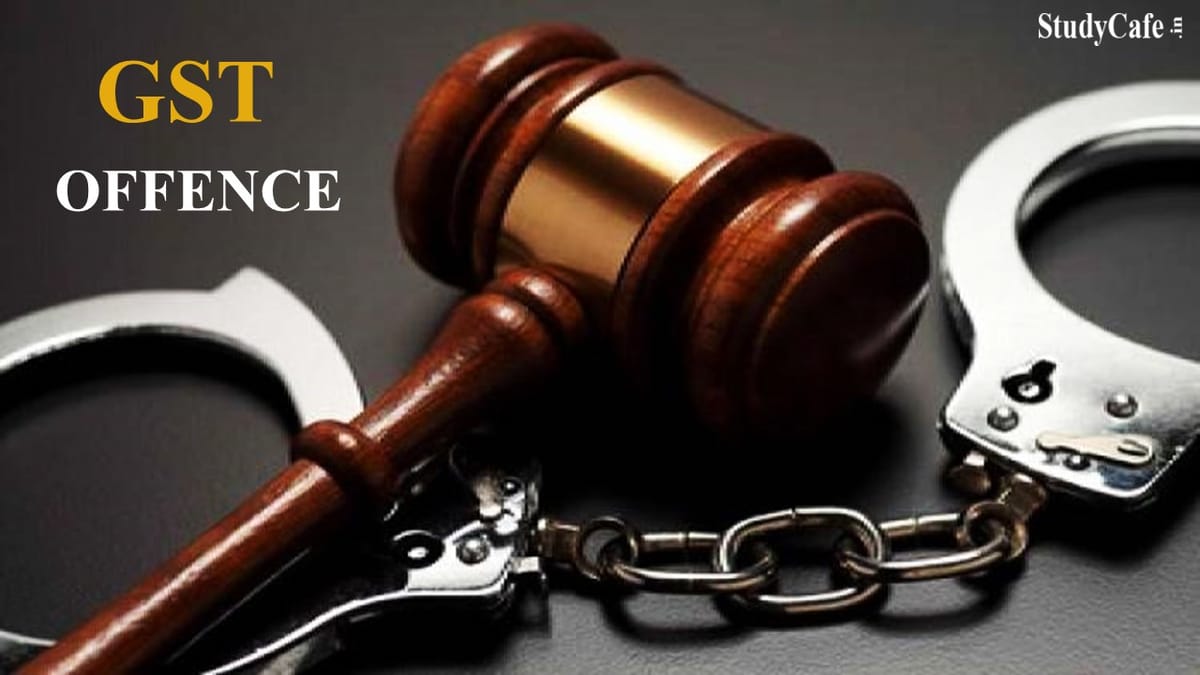Reetu | Sep 2, 2022 |

Govt. issued Guidelines for Launching of Prosecution under CGST Act 2017
The GST Investigation Wing has issued Guidelines for Launching of Prosecution under CGST Act 2017 via issuing Instruction Notification.
Prosecution is the institution or commencement of legal proceeding; the process of exhibiting formal charges against the offender.
The Instruction has provided, “Section 132 of the Central Goods and Services Tax Act, 2017 (CGST Act, 2017) codifies the offences under the Act which warrant institution of criminal proceedings and prosecution. Whoever commits any of the offences specified under sub-section (1) and sub-section (2) of section 132 of the CGST Act, 2017, can be prosecuted.”
1. Sanction of prosecution has serious repercussions for the person involved, therefore, the nature of evidence collected during the investigation should be carefully assessed. One of the important considerations for deciding whether prosecution should be launched is the availability of adequate evidence. The standard of proof required in a criminal prosecution is higher than adjudication proceeding as the case has to be established beyond reasonable doubt. Therefore, even cases where demand is confirmed in adjudication proceedings, evidence collected should be weighed so as to likely meet the above criteria for recommending prosecution. Decision should be taken on case-tocase basis considering various factors, such as, nature and gravity of offence, quantum of tax evaded, or ITC wrongly availed, or refund wrongly taken and the nature as well as quality of evidence collected.
2. Prosecution should not be filed merely because a demand has been confirmed in the adjudication proceedings. Prosecution should not be launched in cases of technical nature, or where additional claim of tax is based on a difference of opinion regarding interpretation of law. Further, the evidence collected should be adequate to establish beyond reasonable doubt that the person had guilty mind, knowledge of the offence, or had fraudulent intention or in any manner possessed mens-rea for committing the offence. It follows, therefore, that in the case of public limited companies, prosecution should not be launched indiscriminately against all the Directors of the company but should be restricted to only persons who oversaw day-to-day operations of the company and have taken active part in committing the tax evasion etc. or had connived at it.
Decision on prosecution should normally be taken immediately on completion of the adjudication proceedings, except in cases of arrest where prosecution should be filed as early as possible. Hon’ble Supreme Court of India in the case of Radheshyam Kejriwal [2011 (266) ELT 294 (SC)] has, inter-alia, observed the following:
(i) Adjudication proceedings and criminal proceedings can be launched simultaneously;
(ii) Decision in adjudication proceedings is not necessary before initiating criminal prosecution;
(iii) Adjudication proceedings and criminal proceedings are independent in nature to each other;
(iv) The findings against the person facing prosecution in the adjudication proceedings is not binding on the proceeding for criminal prosecution;
(v) The finding in the adjudication proceedings in favour of the person facing trial for identical violation will depend upon the nature of finding. If the exoneration in adjudication proceedings is on technical ground and not on merit, prosecution may continue; and
(vi) In case of exoneration, however, on merits where the allegation is found to be not sustainable at all and the person held innocent, criminal prosecution on the same set of facts and circumstances cannot be allowed to continue, the underlying principle being the higher standard of proof in criminal cases.
In light of the Supreme Court’s aforementioned views, a prosecution complaint may even be filed prior to the case’s adjudication, particularly when the crime involved is serious, there are strong supporting arguments, or it is believed that the defendant may delay the adjudication process. Even before the Show Cause Notice is issued, a prosecution complaint may be filed in circumstances where any offender is apprehended under section 69 of the CGST Act, 2017.
Prosecution should normally be launched where amount of tax evasion, or misuse of ITC, or fraudulently obtained refund in relation to offences specified under sub-section (1) of section 132 of the CGST Act, 2017 is more than Five Hundred Lakh rupees. However, in following cases, the said monetary limit shall not be applicable:
(i) Habitual evaders: Prosecution can be launched in the case of a company/taxpayer habitually involved in tax evasion or misusing Input Tax Credit (ITC) facility or fraudulently obtained refund. A company/taxpayer would be treated as habitual evader, if it has been involved in two or more cases of confirmed demand (at the first adjudication level or above) of tax evasion/fraudulent refund or misuse of ITC involving fraud, suppression of facts etc. in past two years such that the total tax evaded and/or total ITC misused and/or fraudulently obtained refund exceeds Five Hundred Lakh rupees. DIGIT database may be used to identify such habitual evaders.
(ii) Arrest Cases: Cases where during the course of investigation, arrests have been made under section 69 of the CGST Act.
1. The prosecution complaint for prosecuting a person should be filed only after obtaining the sanction of the Pr. Commissioner/Commissioner of CGST in terms of subsection (6) of section 132 of CGST Act, 2017.
2. In respect of cases investigated by DGGI, the prosecution complaint for prosecuting a person should be filed only after obtaining the sanction of Pr. Additional Director General/Additional Director General, Directorate General of GST Intelligence (DGGI) of the concerned zonal unit/ Hqrs.
To Read Full Guidelines Download PDF Given Below:
In case of any Doubt regarding Membership you can mail us at [email protected]
Join Studycafe's WhatsApp Group or Telegram Channel for Latest Updates on Government Job, Sarkari Naukri, Private Jobs, Income Tax, GST, Companies Act, Judgements and CA, CS, ICWA, and MUCH MORE!"